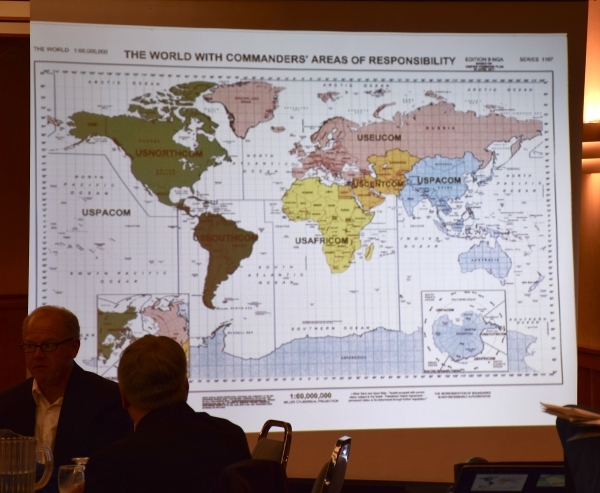BRATTLEBORO — On the weekend that the U.S. marked the 15th anniversary of the Sept. 11, 2001, terror attacks on New York and Washington, retired Vice Admiral Barry Costello said the U.S. military was dropping bombs on targets in Libya, Syria, Yemen, Somalia, Iraq, and Afghanistan.
“The United States is at war every day,” said Costello, who retired from the Navy in 2007, ending his 36-year naval career as commander of the Third Fleet and the 35,000 sailors who patrol the Persian Gulf.
Speaking at American Legion Post 5 on Sept. 15 as part of a lecture series looking back at the 15 years since 9/11, Costello gave a whirlwind look at U.S. foreign policy since 2001.
Costello, a Rutland native who is only the fourth Vermonter to have held the rank of admiral, was at the Pentagon on 9/11 when one of the four hijacked airliners was crashed into the nerve center of the U.S. military. The attack killed all 64 passengers aboard the plane, the five hijackers and six crewmen, and 125 people in the building.
'Just around the corner'
“My office was just around the corner from where the plane hit,” Costello said.
As bad as that day was, Costello said he will always remember how the next day, 22,000 employees “came back to work in a building that was still smoking and burning.”
That's when work began on creating the U.S. Northern Command (USNORTHCOM), charged with protecting North America from the Arctic Circle to southern Mexico.
“We never thought we needed a new command area for the United States,” said Costello. “That changed after 9/11. We're living in a different world now.”
Costello showed a map of the world divided into six sectors where U.S. forces operate and the various strategic challenges facing the U.S.
He said that USSOUTHCOM, the U.S. Southern Command that encompasses South America, is one of the more stable regions right now.
USAFRICOM, the U.S. African Command that covers the entire continent except for Egypt, has grown in strategic importance, Costello said, with Libya, Somalia, and South Sudan among the hot spots.
Familiar territory
Costello is most familiar with USCENTCOM, the U.S. Central Command that covers the Middle East from Egypt to Afghanistan, plus Central Asia. At the start of the U.S. invasion of Iraq in 2003, he commanded the carrier USS Constellation, which provided air support during the first stages of the fighting.
That's where the bulk of the U.S. military is engaged in combat. Between the Syrian civil war, fighting the Islamic State in Iraq, the Taliban in Afghanistan, and various al-Qaeda affiliates in Yemen and neighboring countries, Costello said the U.S. will be engaged militarily in that region for years.
USPACCOM, the U.S. Pacific Command, will become a greater focus for the U.S. in future years, he said, with rivalries between China, Japan, and North Korea providing most of the tension.
“There's a lot of history, and not much of it good, between those countries,” Costello said.
Finally, USEUCOM, the U.S. European Command, which covers Europe and Russia. Costello said this is an area that's more contentious. He cited England's decision to leave the European Union, Russia's aggressive posture in the Baltic states as well as Ukraine, and Germany's fears of a resurgent Russia as the main sources of tension now.
“[Russian President] Vladimir Putin wants to reconstitute the U.S.S.R.,” said Costello. “With the Russian economy in trouble, he has to do something.”
Cautious optimism
Summing up the global picture, Costello called himself “a glass half-full guy.”
“Am I concerned about the state of play in the world? Absolutely. But at the end of the day, we have great men and women in our military. They are out there tonight protecting this nation. They are all volunteers and they are very good at what they do. They are young, brave, ordinary people doing extraordinary things on a daily basis. That's why I am very, very upbeat about our military today.”
When asked about the Iraq War, which Costello was a part of for the final four years of his naval career, he said the military did its part, but the civilian leadership “fumbled the ball.”
He also pointed out that, even with a world in turmoil, “it is very important that our country figures out what is in our national interest before we spill even one drop of blood.”
Costello put the responsibility for that decision squarely on the American people.
“It is a healthy thing to question what we are doing and why we are doing it,” he said.
